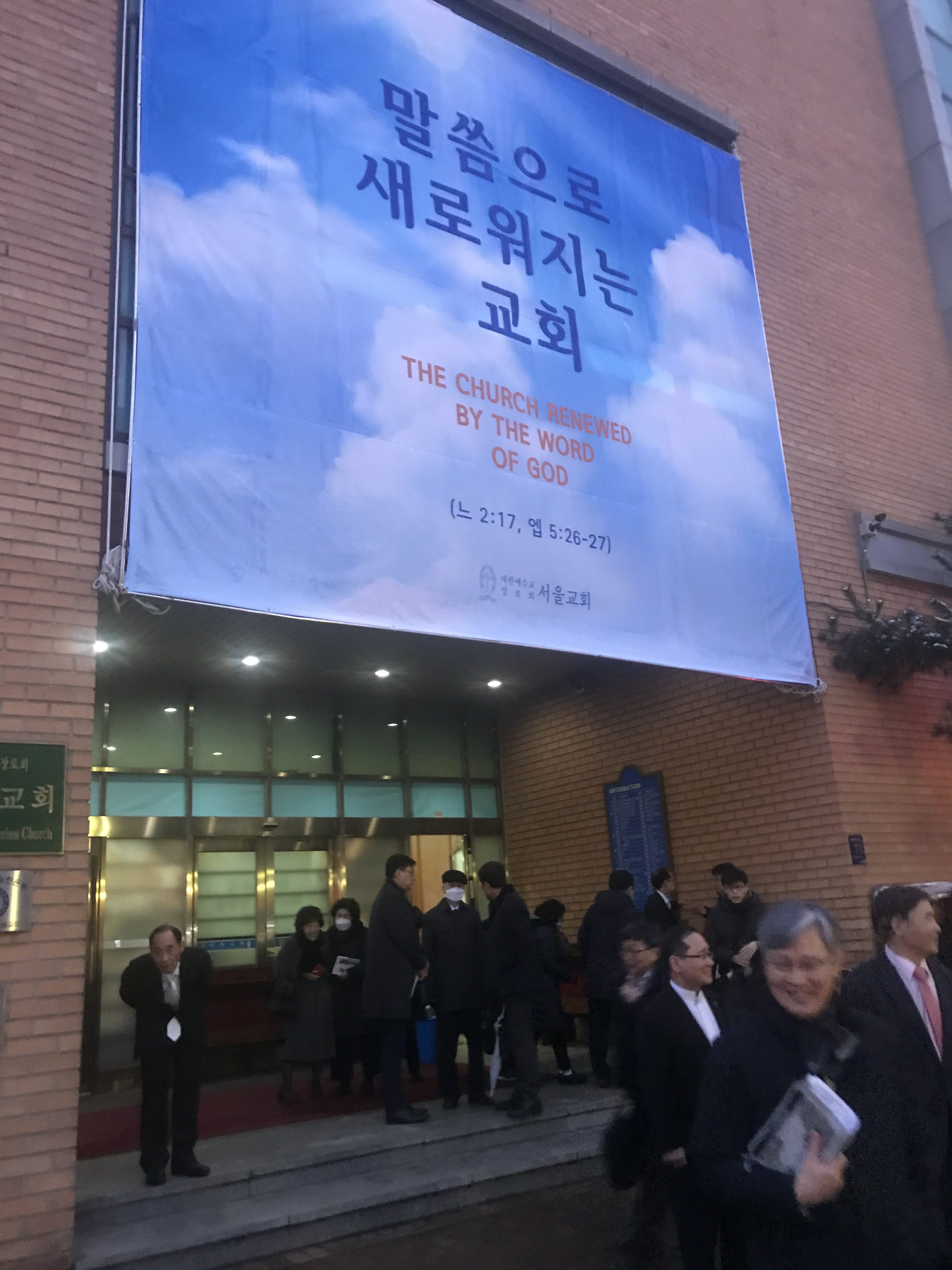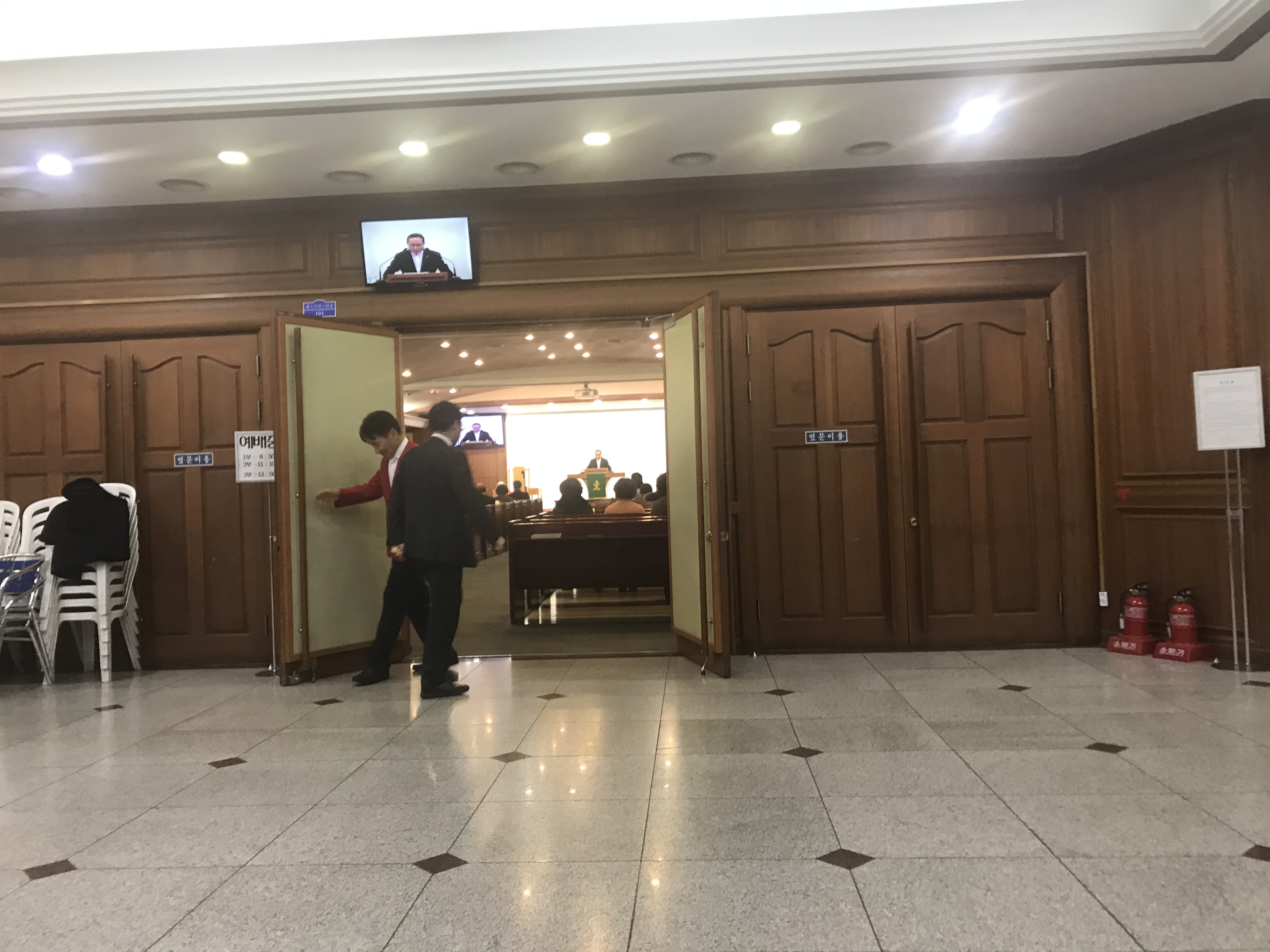Dear Brothers and Sisters,
Greetings from Seoul. Made it here. There was considerable doubt about whether I would come here to speak at a Presbyterian ministers conference – because of the Coronavirus. The Presbyterian seminary had cancelled its prize giving because there are a significant number of Chinese students. Also the public meetings I am speaking at in the evenings – are now no longer taking place – but the rest of the conference is going ahead.
Coming here on Air Korea was interesting…All the cabin crew except one stewardess serve you with face masks…most of the people sitting around me (all Koreans) are wearing face masks. I felt really self-conscious because I have a cough – and my facemask is in my suitcase. I understand that it would be considered impolite for me to go out in public (with a cough) without putting the mask on. It was also unusual to be in a plane – where everyone I saw was Korean apart from yours truly.

 This place is quite overwhelming. It has already been a real eye opener. It is so different – and in some ways I think it is like getting a glimpse of at least part of the future. Asia’s mega cities are something else. Driving through Seoul was remarkable….mile after mile of high-rise apartment blocks alongside superhighways. Seoul has a bigger population than London – 10 million (twice the size of Scotland), but if you take in the bigger urban area it is the fifth largest urban area in the world (all of the top five are in Asia) with a population of 23 million. In terms of GDP South Korea is 11th in the world.
This place is quite overwhelming. It has already been a real eye opener. It is so different – and in some ways I think it is like getting a glimpse of at least part of the future. Asia’s mega cities are something else. Driving through Seoul was remarkable….mile after mile of high-rise apartment blocks alongside superhighways. Seoul has a bigger population than London – 10 million (twice the size of Scotland), but if you take in the bigger urban area it is the fifth largest urban area in the world (all of the top five are in Asia) with a population of 23 million. In terms of GDP South Korea is 11th in the world.
The Church is also overwhelming. Many times I have gone into the small old parish church in Nigg, right beside my old primary school, and thought about John Ross, the minister who went from there to Manchuria, and ended up being the first to translate the Bible into Korean. American, Scottish and Australian Presbyterian missionaries did a remarkable work here. As a result there are now thousands of Presbyterian churches – there are five main Presbyterian denominations (although sadly the total number is 300 – it seems that one things the Koreans learned to do better than the Scots – is split!) – the largest has over 11,000 churches. There are more churches in that one denomination than there are members in the Free Church!

 The church I was preaching in this evening, Seoul Presbyterian, is relatively moderate by Korean standards – about 1500 people. The largest Presbyterian church (not denomination) in the world is here – it has 120,000 members. There is a Pentecostal church here that has 500,000 members. Everything is on a different scale.
The church I was preaching in this evening, Seoul Presbyterian, is relatively moderate by Korean standards – about 1500 people. The largest Presbyterian church (not denomination) in the world is here – it has 120,000 members. There is a Pentecostal church here that has 500,000 members. Everything is on a different scale.
Korea is one of the most ethnically homogeneous countries in the world – with 99% of people living in Korea being ethnically Korean. There is a strong sense of Korean identity. I think that that is both strength and a weakness. One of the weaknesses is that when Koreans move to another country they tend to have their own churches – which are ethnically homogenous. To my mind that means that both they and the countries they live in, miss out. We have a lot to learn from the Korean church – and vice versa.

The weather here just now is literally freezing – coming from Sydney in the midst of summer to Seoul in winter and temperatures of minus three…is a bit of a shock – but the Korean Reformed church is certainly not the frozen chosen. What struck me this evening was the warmth of the people. They listened attentively to the Word of God (despite it having to be translated) and they engaged – even verbally with what was being said. I loved the enthusiasm of the singing – but I think most of all I saw kindness in the faces. To me it was clear that the most important thing was that we were brothers and sisters in Christ. It was lovely leaving the church – because of the Coronavirus facemasks and hand sterilisers are everywhere. This also means that the traditional Presbyterian greeting of a holy kiss (which being translated meaneth ‘holy handshake’) is not being used just now. Instead of shaking hands we just bowed to one another. I loved it.
I am looking forward tomorrow to speaking at the Presbyterian pastors conference and to learn more about this strange and wonderful land – and what the Lord is doing here. I suspect that it will have considerable implications for the work of the Gospel in the rest of the world. In that regard it was good to hear of a Korean-American – Julius Kim – replacing Don Carson as the next President of The Gospel Coalition.
The world needs more Koreans engaged with the wider church and helping us as we seek to work to work together for the Kingdom. It was humbling to meet a senior pastor who has had a great influence here – who was trained by that great Highland theologian – Prof John Murray. It was also good to meet Chang-Wun Shu who trained with me at the Free Church College and is now a senior minister here. What goes around comes around. Cast your bread on the waters and after many years it will come to you,
I pray that will have had a blessed Lord’s Day,
Till next week,
Yours in Christ,
David
Letter from Australia 28 – Rain, NorWest , Birthday Celebrations and a Tale of Two Steves
A.S.K 31 – How Would Jesus Respond to North Korea?


I’m no expert on translations of the Bible into Korean but according to Wikipedia the first translation of the Bible into Korean was completed in 1784. The Ross translation was completed 103 years later.
1784 – Literal Translated Bible (성경직해) – Roman Catholic. First all Korean language Bible. John the Baptist Choi Chang Hyun (최창현 세례자 요한)’s translation.
1887 – The Ross New Testament (all New Testament Books) by John Ross et al., at Dongguan Church in Mukden, Manchuria.
God bless you as you minister in Korea.
Christianity was the fastest-growing religion in South Korea but now it seems to have stalled and declined. I am worried that this might happen in other places like African countries where Christianity is exploding. It seems Christianity is popular but once modernization happens it goes into decline as happened in Europe in the past.
See this link https://www.thegospelcoalition.org/article/christianity-quit-growing-korea/